Explainer: How does the Constitutional process to elect Iran’s president work?
By Xavier Villar
The presidential election in Iran is slated to take place on June 28 following the passing of President Ebrahim Raeisi in a helicopter crash on May 19 while he was in his third year in office.
Six candidates are running for the top executive office of the Islamic Republic of Iran who were qualified by the country’s top election supervisory body, the Constitutional Council earlier this month.
The candidates are currently engaged in election campaigning with three televised debates already generating enthusiasm from voters.
The fourth debate is scheduled for Monday and the last one is on Tuesday, after which the stage will be set for voting on Friday.
What does Iran’s Constitution say about elections?
Article 6 of the Iranian Constitution underscores the importance of public participation in the political affairs of the Islamic Republic, stating that "the affairs of the state shall be managed by relying on public opinion through elections such as those for the president, representatives of the Islamic Consultative Assembly, members of local councils, as well as through referendums."
The Constitution of the Islamic Republic of Iran, enacted following the Islamic Revolution in 1979 and later amended in 1989, together with five electoral laws, provides the legal framework for elections.
Articles 114-120 of the Constitution define the electoral system for the presidency, candidate requirements, the maximum period between elections, and terms of re-election.
Article 99 specifies that the Guardian Council (Constitutional Council) “is responsible for overseeing elections for the Assembly of Experts, the presidency, the parliament (Majles), and referendums."
Alongside the Constitution, these five electoral laws constitute the legal framework for the administration and supervision of elections in Iran:
- Presidential Elections Law
- Islamic Consultative Assembly Elections Law
- Law on the Organization, Functions, and Elections of Islamic Councils and Mayors
- Law on the Supervision by the Guardian Council of Presidential Elections in the Islamic Republic of Iran
- Law on the Supervision by the Guardian Council of Elections for the Islamic Consultative Assembly
An Overview of the President's Key Duties, responsibilities, and Powers in Iran.#IranVotes2024
— Press TV 🔻 (@PressTV) June 19, 2024
Follow us on Telegram: https://t.co/GKZwI4ehqL pic.twitter.com/oZw0earyOG
What does the Constitution say about the presidential election?
The Presidential Elections Law establishes provisions regarding the right to vote, organization and administration of elections, electoral system, registration and qualification of candidates, electoral campaign, resolution of electoral disputes, as well as electoral violations and their penalties.
According to Article 1, the presidential term is four years from the moment the Leader of the Islamic Revolution approves the president's credentials.
Article 10 specifies that the president must be elected by direct and popular vote. Presidents are allowed to seek only two consecutive terms, but they have the option to seek re-election after a one-term interval.
The presidential elections in Iran are based on a system of absolute majority competition, where candidates compete to obtain an absolute majority of the votes.
According to Article 14 of the country’s Constitution, if an absolute majority is not achieved in the first round, a runoff election is held on the Friday following Election Day between the two candidates with the highest number of votes.
Which are the entities responsible for managing elections?
In Iran, two bodies are responsible for managing activities related to presidential and parliamentary elections: the Constitutional (Guardian) Council and the Ministry of Interior Affairs.
The Constitutional Council has the autonomy to oversee, monitor, and establish policies for conducting elections, while the Ministry of Interior Affairs carries out electoral operations under the authority of the Council.
The Constitutional Council is a body composed of twelve members: six qualified theologians in Islamic jurisprudence and six jurists specialized in various fields of law.
The Leader of the Islamic Revolution directly appoints the theologians, while the jurists are nominated by the head of the judiciary and elected by a plural vote in parliament.
The Constitutional Council holds extensive legislative and executive powers. It reviews all legislation passed by parliament and has the authority to approve or reject a bill based on its conformity with Islamic principles and constitutional law.
According to Article 4 of the Iranian Constitution, "All laws and regulations, including civil, penal, financial, economic, administrative, cultural, military, and political, must be based on Islamic principles," and "it shall be decided by the theologians of the Guardian Council whether such laws and regulations comply with this article."
The interpretation of the Constitution also falls under the purview of the Constitutional Council.
According to Article 98 of the Constitution, "The authority to interpret the Constitution is vested in the Constitutional Council, which must be done with the consent of three-quarters of its members," and can be initiated upon request from the Leader, President, Speaker of Parliament, Chief of Judiciary, or a member of the Council.
The decision to review a request requires a majority vote of all members of the Council.
Conforming to Article 99 of the Constitution, the Council plays a crucial role in the political supervision of elections for the Assembly of Experts, the Presidency, the Majlis (Parliament), and referendums.
Take a look at some important slogans and plans of the presidential candidates on various issues.#IranVotes2024 https://t.co/Tli4JAJynZ pic.twitter.com/0Scb9oeCr0
— Iran Election 2024 (@PressTVElection) June 17, 2024
What are the duties of the Constitutional Council viz a viz elections?
In addition to validating candidates' credentials, the Constitutional Council exercises significant supervisory powers, which include:
- Setting the date of elections.
- Addressing complaints and resolving electoral disputes.
- Overseeing the operations of the Electoral Campaign Monitoring Commission, tasked with regulating the conduct of presidential candidates and their activities during the campaign.
- Annulment of elections in an electoral district or suspension of the electoral process.
- Approving amendments and revisions to all electoral laws.
- Certifying election results.
During presidential and parliamentary elections, the Council implements its supervisory role by forming specialized committees.
For presidential elections, it establishes a Central Supervisory Committee (CSC) composed of seven members selected by an absolute majority.
This committee includes two members from the Council and five individuals recognized in the Muslim community for their knowledge, reliability, and respect.
The Central Supervisory Committee is responsible for overseeing all phases of the electoral process, as well as the conduct of the Ministry of Interior Affairs and any matters related to the validity of elections.
Additionally, the CSC is tasked with appointing electoral supervisors for each of Iran's 368 electoral districts. These supervisors, who must be knowledgeable, reliable, and respected, oversee the electoral process at the county level and report any infractions or irregularities to the Central Supervisory Committee.
The Ministry of Interior Affairs plays a crucial role in the electoral process, responsible for managing all activities related to elections under the supervision of the Constitutional Council.
During the electoral cycle, temporary bodies are established at the national and local levels to implement voting. Additionally, there is a permanent Electoral Office composed of professionals that operates year-round, tasked with planning and organizing the logistical aspects of elections.
The Electoral Office is a permanent entity within the Ministry of Interior Affairs, housed under the Office of Political Affairs. It consists of permanent staff including a director, two deputy directors, and 25 senior experts specializing in fields such as statistics, elections, legal affairs, logistics, and budgets.
The primary function of the Electoral Office is to plan and prepare national and local elections.
“Ballot box only way to solve country’s problems.”
— Iran Election 2024 (@PressTVElection) June 22, 2024
In some cities, Iranians gathered in public places to watch the third presidential debate and discuss the upcoming vote. #IranVotes2024 pic.twitter.com/FfY3hiiegG
What does Iran’s Constitution say about the role of president?
The Constitutional amendment of 1989 brought about significant changes to Iran's political structure.
The position of prime minister was abolished, and the president was established as the head of the executive branch of the government, elected through direct popular vote.
According to the Constitution, the president holds "the highest official position in the country” after the Leader of the Islamic Revolution. Their responsibilities include implementing the Constitution and acting as a liaison between the judicial, executive, and legislative branches of government.
The president is elected for a four-year term and cannot serve more than two consecutive terms.
To run for elections in Iran, a candidate must meet the following requirements:
- Be of Iranian origin or hold Iranian citizenship.
- Possess management and leadership skills.
- Be respected, reliable, and pious.
- Profess loyalty to the principles of the Islamic Republic and the official state religion.
The rules governing presidential elections in Iran are based on a system of majority with a second round: a candidate needs an absolute majority (meaning 50% plus one) to win in the first round.
If no candidate achieves this majority in the first round, a second round of voting takes place.
The vote of Iranian citizens residing outside the country is managed through Iranian consulates and embassies abroad.
Presidential candidates must complete a nomination form and submit it to the Ministry of Interior Affairs within five days after the announcement of the start of elections.
Subsequently, the Ministry of Interior Affairs collects all applications and forwards them to the Constitutional Council for review and approval.
The Council reviews the applications within five days and subsequently sends a list of qualified candidates to the Ministry of Interior Affairs, which announces the final list of candidates to the public.
Presidential campaigns in Iran commence with the publication of the final list of candidates and conclude 24 hours before Election Day.
The law ensures equitable campaign conditions for candidates, including equal access to Iran's state media such as the Islamic Republic of Iran Broadcasting (IRIB). The Campaign Monitoring Commission (CMCE), a temporary body established by the Ministry of Interior Affairs, oversees the electoral campaign to ensure that all candidates have fair access to state resources.
The Campaign Monitoring Commission (CMCE) is composed of the Attorney General or their representative, the Minister of Interior or their representative, the Director of the Islamic Republic of Iran Broadcasting (IRIB), and a representative of the Guardian Council.
D-8’s role in Iran’s economy after Cairo summit
China slams US as ‘war-addicted’ threat to global security
China ‘firmly opposes’ US military aid to Taiwan
VIDEO | Press TV's News Headlines
President Yoon Suk Yeol to be removed from office
At least 19 Gazans killed by Israeli airstrikes since dawn: Medics
Leader: Iran neither has nor needs proxy forces
US fighter aircraft shot down ‘in friendly fire’ amid aggression on Yemen


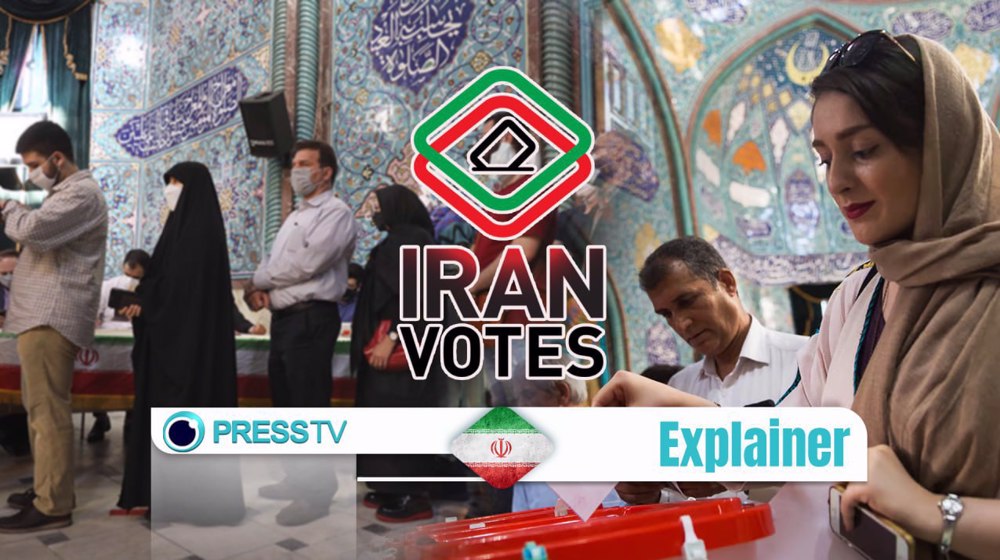






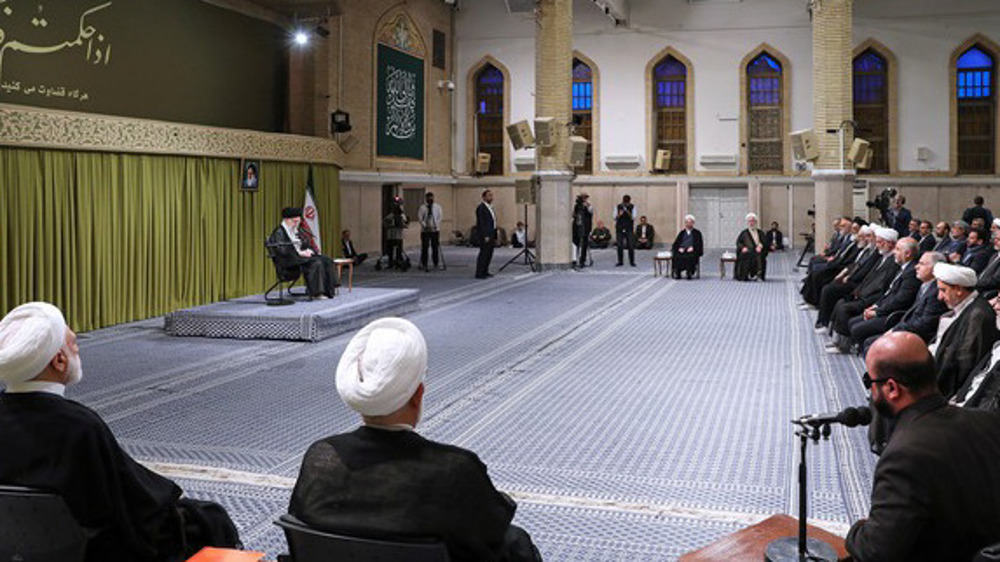
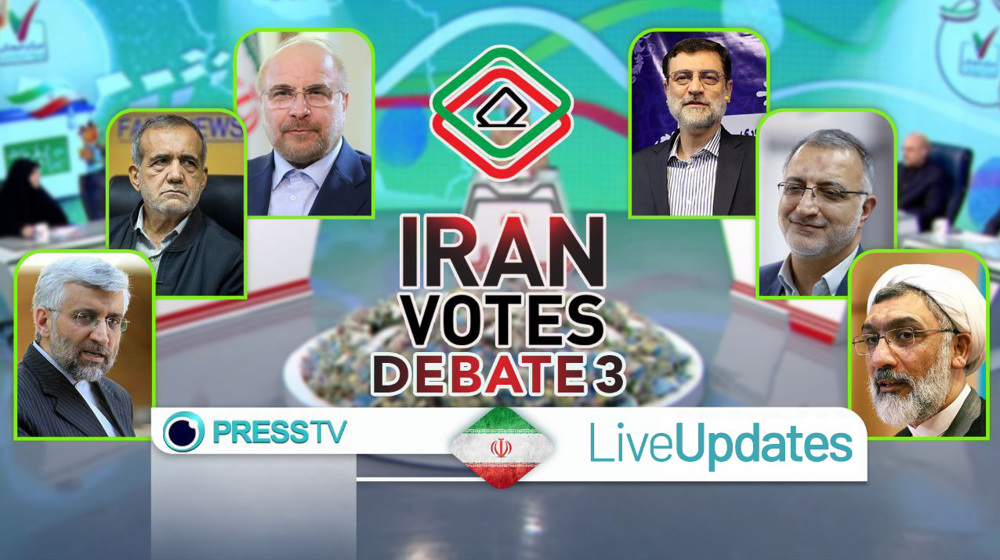
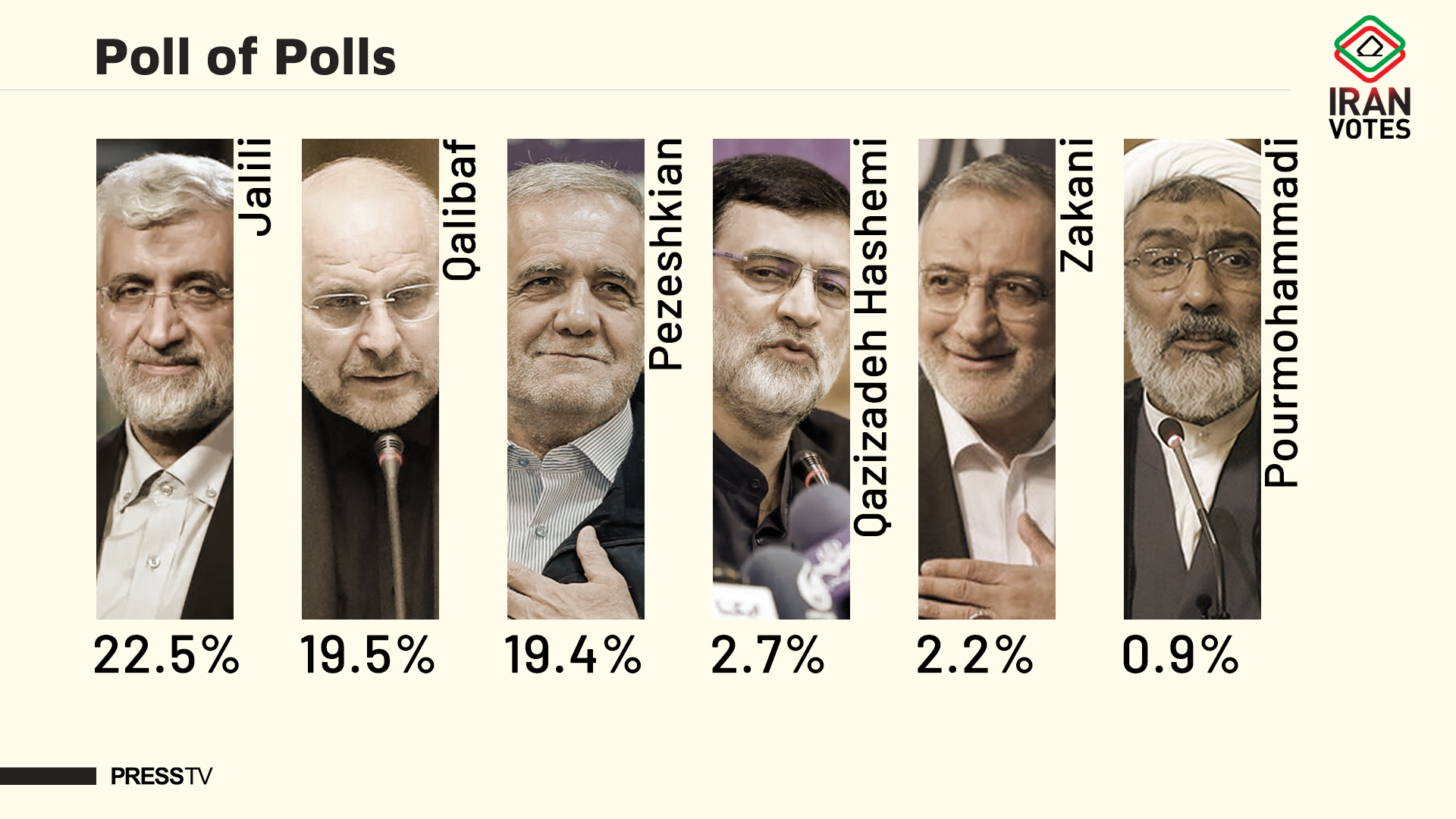
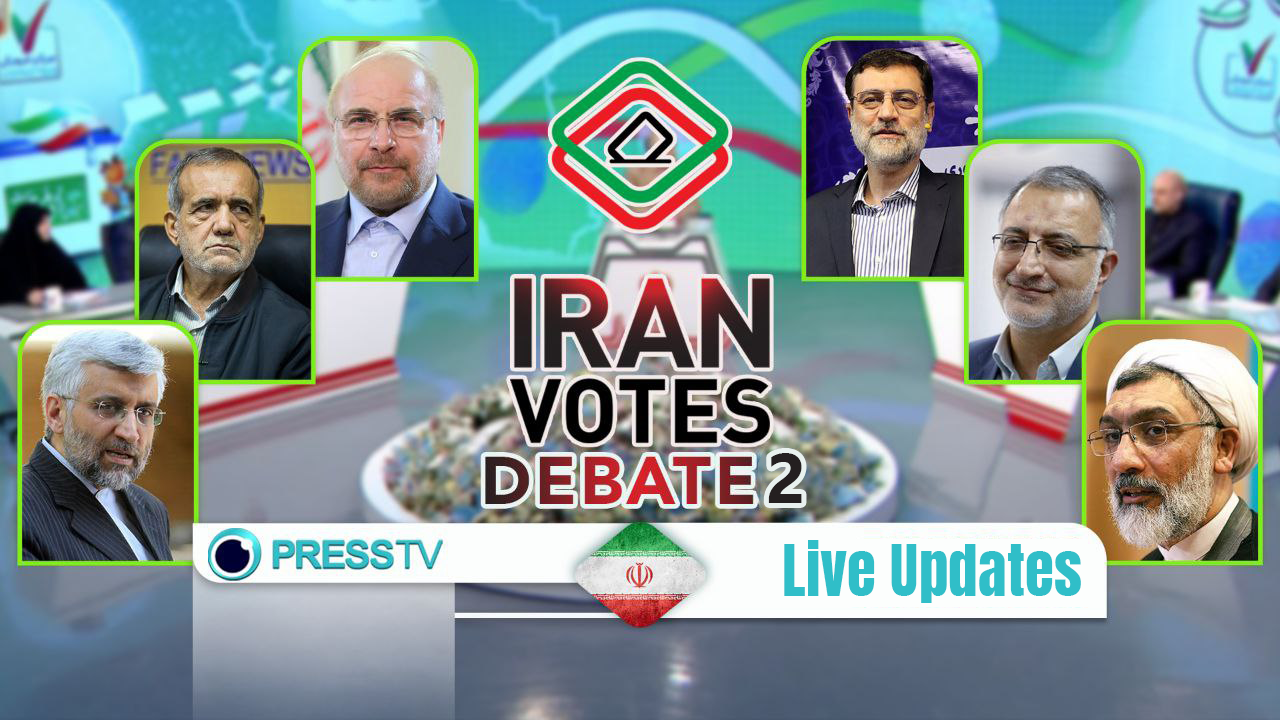
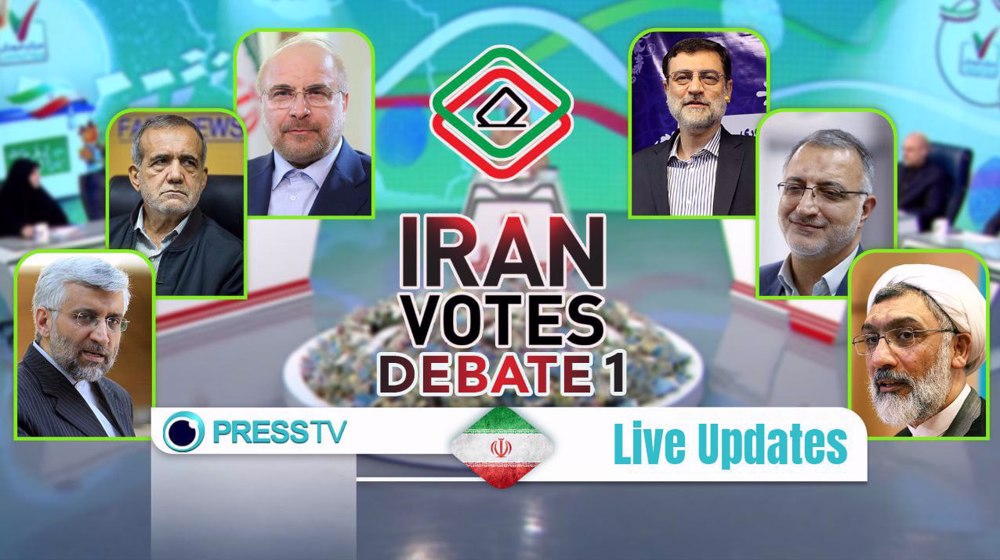

 This makes it easy to access the Press TV website
This makes it easy to access the Press TV website